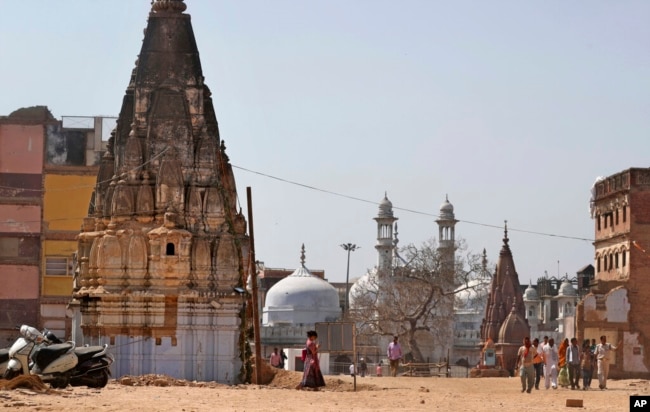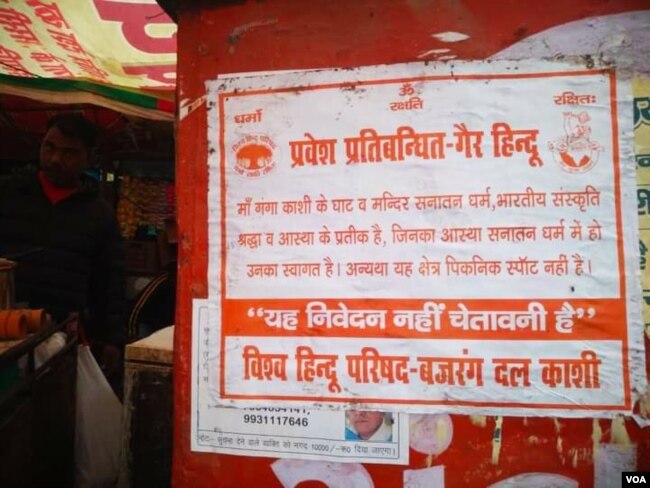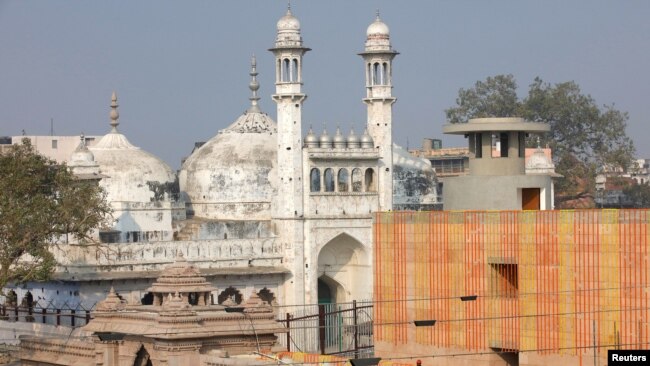イスラム教VSヒンドゥー教紛争:インド
なぜ宗教は排他的なのでしょうか?
信仰心あるものの上には、”愛” が降り注ぐのではないのですか?
他信仰を受け入れない、なぜ?
VOAで英語を学びましょう!!Now
インドのモスク紛争(和訳)
India’s Mosque Dispute
June 02,2022
インドのバラナシという街では、300年近く前からイスラム教徒とヒンドゥー教徒が、壁一枚隔てて祈りの場を共にしています。
一方にはイスラム教徒のためのモスクがあり、もう一方にはヒンドゥー教の寺院があります。1カ月前まで、この場所は、紛争が絶えない地域で2つの宗教が共存できる例として考えられていました。
今、ヒンズー教徒のグループがギャンバピ・モスクのエリア内で祈ることを望んでいます。彼らは地元の裁判所に自分たちの裁判を依頼しました。彼らの主張は、モスクは数百年前にムガール帝国皇帝によって破壊された古いヒンドゥー寺院の跡に建てられたというものです。彼らは、モスクのエリアにはヒンドゥー教の像が中にあると言います。しかし、モスクの指導者は反対しています。
この訴訟事件は、民族主義的なヒンドゥー教団体が自分たちのものだという土地を要求する最も新しい例です。彼らは、何千ものモスクがヒンズー教の寺院の上に建てられたと考えています。歴史家たちは、この数字は誇張されたものだと言います。宗教的な理由ではなく、政治的な理由で破壊された寺院の数はごくわずかだと彼らは言います。
インドは公式には非宗教的な国です。しかし、ヒンズー教の民族主義者たちは、インドを宗教の国にしようとしました。イスラム教徒のような宗教的少数派は攻撃にさらされてきました。
法的なケースは、イスラム教徒の人々の中で、宗教的な中心地に対する恐怖を増大させています。
1992年、ヒンドゥー教民族主義者の群れが、1500年代に建てられたバブリー・モスクを破壊しました。この破壊はイスラム教徒とヒンドゥー教徒の間の暴力につながり、2000人以上の死者を出し、そのほとんどがイスラム教徒でした。
ニランジャン・ムコパディヤイ氏は、インドの政治専門家です。彼は、多くの事件を法廷に持ち込むのは、イスラム教徒が公の場で宗教を見せないようにするためであり、彼らの信仰はもはや受け入れられていないと述べています。
バラナシにある2つのコミュニティは意見が合いませんでしたが、先週まで意見の相違を悪化させることはありませんでした。ヒンドゥー教徒の女性5人がギャンバピ・モスクで祈る許可を裁判所に求めたため、地元の裁判所はギャンバピ・モスクの検査を命じたのです。
5人の女性の弁護士であるハリ・シャンカール・ジャイン氏は、モスク内にある石の物体がヒンズー教の神シヴァを表現したものであることを示すビデオ証拠があると述べました。それは、イスラム教徒が祈りの前に身を清めるために使う水たまりの中で発見されました。
「モスクが建っている土地はヒンズー教徒のものであり、私たちに返還されるべきです。」とジャイン氏は言います。
地元の裁判所は、モスクの封鎖を命じ、イスラム教徒がそこに集まることを禁止しました。インドの最高裁は下級審の判決を覆しました。しかし、石が置かれている場所は封鎖され、モスクの一部はイスラム教徒が利用できないままになっています。
現在、バラナシの高等裁判所がこの件を取り上げています。
モスクの指導者たちは、法的な主張を疑問視し、石の部分は噴水の土台だと言っています。イスラム側の弁護士は、モスクに対するこれらの行為は、1991年に制定されたPlaces of Worship Actという法律により違法であると述べています。この法律は、1947年8月15日にインドがイギリスから自由を勝ち取った日から、いかなる宗教的な場所もそのままにし、変えてはならないとしています。
ヒンドゥー教徒の市民が各地のモスクで祈りを捧げたいと願い、裁判に発展するケースはますます増えています。これは、モディ首相の民族主義政党がヒンドゥー教を支持するキャンペーンに役立っています。
ギャンヴァピ・モスクの弁護士、ナジム・パシャ氏は、これらの行為はヒンドゥー民族主義者の支持を得るための慎重なパターンであると述べます。
India’s Mosque Dispute
In the city of Varanasi, India, Muslims and Hindus have shared a place of prayer for almost three hundred years which is separated by only a wall.
On one side, there is a mosque for Muslims. On the other side, there is a Hindu temple. Until a month ago, the place was considered an example of how the two religions can exist together in an area marked by conflict.
Now groups of Hindus want to pray inside the Gyanvapi mosque area. They have asked a local court to hear their case. Their argument is that the mosque was built on the ruins of an old Hindu temple that was destroyed by a Mughal emperor hundreds of years ago. They say the mosque area has Hindu statues inside. But the mosque’s leaders disagree.
The legal case is the most recent example of nationalist Hindu groups demanding land that they say belongs to them. They believe thousands of mosques were built on top of Hindu temples. Historians say that these numbers are overstated. They say only a small number of temples were destroyed for political reasons, not religious ones.
India is officially a secular country. But Hindu nationalists have tried to make India into a religious country. Religious minorities, like Muslims, have come under attack.
Legal cases have increased fear within Muslim populations about their religious centers.
In 1992, a crowd of Hindu nationalists destroyed the Babri mosque built in the 1500s. The destruction led to violence between Muslims and Hindus, leaving more than 2,000 people dead. Most were Muslim.
Nilanjan Mukhopadhyay is an Indian political expert. He said that bringing many cases before the courts is a way to keep the Muslims from showing their religion in public and that their faith is no longer accepted.
The two communities in Varanasi disagreed, but they did not let the disagreement worsen until last week. The local court ordered the Gyanvapi mosque to be inspected after five Hindu women asked the court for permission to pray there.
The lawyer of the five women, Hari Shankar Jain, said there was video evidence that a stone object inside the mosque was a representation of the Hindu god, Shiva. It was found inside a water pool used by Muslims to purify themselves before prayers.
"The land on which the mosque is built belongs to Hindus and should be returned to us," Jain said.
The local courts ordered the mosque blocked off and banned Muslims from gathering there. India’s Supreme Court overturned the lower court’s ruling. But it still blocked the area where the stone rests, leaving part of the Mosque unavailable to Muslims.
Now a higher court in Varanasi has taken up the case.
The leaders of the mosque have questioned the legal claims and said that the stone area was the base of a fountain. Lawyers for the Muslim side have said that these actions against the mosque are illegal because of a 1991 law called the Places of Worship Act. It says any religious area should be kept as such and not changed from the day that India won its freedom from Britain, on August 15, 1947.
More and more cases end up in court as Hindu citizens ask to pray in mosques around the country. This has helped Prime Minister Modi’s nationalist party in their campaign to support Hinduism.
A lawyer for the Gyanvapi mosque, Nazim Pasha, said these actions are a careful pattern meant to gain the support of Hindu nationalists.
Words in This Story
mosque — n. a building that is used for Muslim religious services
temple –n. a building for worship or religious observance
emperor -n. a man who rules an empire
secular – adj. not religious: of or relating to the physical world and not the spiritual world: of, relating to, or controlled by the government rather than by the church
faith – n. the belief that something is good, right and able to be trusted; also in reference to a religion
fountain – n. a structure or device that provides water that, in some cases, sends a stream of water into the air
worship – v. to show respect and love for God or for a god especially by praying, having religious services, etc.
pattern– n. something that happens in a repeated way


